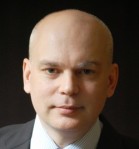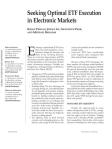Below courtesy of extract from Bloomberg LP 29 Sept reporting.
International Securities Exchange Holdings Inc. applied to create its third U.S. options exchange, to be called ISE Mercury.
ISE, a unit of Deutsche Boerse AG that already operates two options venues in the U.S., said the new venue’s structure, fees and products will be made public at a later date. Should ISE Mercury open, it would be the nation’s 13th options market.
“ISE Mercury will use our proven technology platform to service a segment of the options market not currently active on ISE or ISE Gemini,” Boris Ilyevsky, managing director of ISE’s options exchanges, said in a statement. “Our goal is to reach broadly across market segments and to deliver innovative trading functionality, superior customer service and competitive fees to different constituencies in the industry through our three exchanges.”
The firm last year started a second exchange, ISE Gemini, that had a market share of 3.8 percent at the end of last week, according to data from Options Clearing Corp. ISE’s namesake platform’s market share was 11.1 percent, placing it fourth among the 12 options venues.










